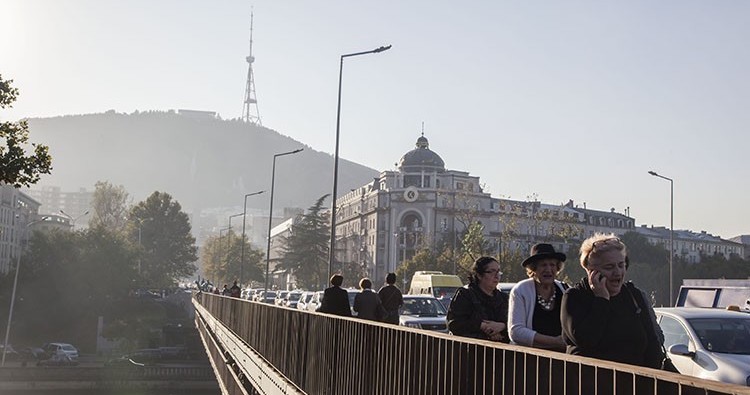'Georgia pushes its boundaries':
fDi Intelligence publishes report on investment potential of Georgia

The report reads that a growing number of investors are now 'waking up to Georgia's charm', which has implemented 'ambitious economic and political reforms', modernised the nation and 'won plaudits' from international observers with its liberalised economy, strengthened institutions and eradicated corruption. Photo: Nino Alavidze/Agenda.ge.
News and FDI publication, fDi Intelligence, has published a special report titled 'Georgia Pushes its Boundaries – the Country is Positioning Itself as the Next Global Trade Hub', which overviews the investment potential of the economic sectors of Georgia and offers exclusive interviews with high officials from Georgia's economic team.
The report reads that a growing number of investors are now 'waking up to Georgia's charm', which has implemented 'ambitious economic and political reforms', modernised the nation and 'won plaudits' from international observers with its liberalised economy, strengthened institutions and eradicated corruption.
The government’s drive to make life as easy as possible for businesses pushed Georgia to seventh in the World Bank’s latest Ease of Doing Business rankings; within Europe, it trails only Denmark. It takes just one day to do hundreds of administrative processes, including registering a business or property. The 9.9% effective corporate tax rate is the third-lowest in the world and, in 2017, it introduced the so-called Estonian tax model, which exempts retained and reinvested profits from business tax", reads the report.
However, the report says that while reforms have boosted Georgia’s attractiveness as a business destination, 'they cannot fix one of the country’s major drawbacks: its population of just 3.7 million has limited appeal as a consumer market'.
 The report reads that Georgia's population of just 3.7 million has limited appeal as a consumer market'. Photo: Nino Alavidze/Agenda.ge.
The report reads that Georgia's population of just 3.7 million has limited appeal as a consumer market'. Photo: Nino Alavidze/Agenda.ge.
Having this challenge in mind, the report reads that the government is integrating the country into global value chains via an extensive and growing network of free trade agreements (FTAs) that give customs free access to a market of 2.3 billion people.
Georgia has struck FTAs with China, the EU, the UK, Turkey and the Commonwealth of Independent States. By enlarging the market, it hopes to lure companies wishing to capitalise on Georgia’s business climate and export its goods tariff-free.
The report reads that despite the above-mentioned developments the improvements are needed in the political arena.
Concerns over judicial independence have prompted calls from Transparency International and DFIs to reform the court system and judge-selection processes", reads the report.
Economic growth in Georgia
Georgia averaged 5% economic growth between 2005 and 2019. Fitch forecasts growth of 4.3% this year and 5.8% in 2022, which is 'a faster recovery than other BB countries'.
But Paul Gamble, its head of emerging Europe sovereign ratings, warns no amount of good policy-making can eliminate Georgia’s economic risks from abroad.
 Fitch forecasts growth of 4.3% this year and 5.8% in 2022, which is 'a faster recovery than other BB countries'. Photo: Nino Alavidze/Agenda.ge.
Fitch forecasts growth of 4.3% this year and 5.8% in 2022, which is 'a faster recovery than other BB countries'. Photo: Nino Alavidze/Agenda.ge.
This is a small open economy and is vulnerable to shocks. It has important, but complicated, relations with Russia, and is heavily exposed to Turkey via trade, investment and tourism. Its policy framework is good, but it is very heavily exposed to external events,” Gamble says.
There are domestic shortcomings, too, says the report.
While low utility costs and an average monthly salary of $390 makes for a cost-competitive operating environment, there is a persistent skills gap. The unemployment rate is consistently in double digits and more than half of those looking for work are under 34", reads the report.
Attuned to this, the government has made education a key priority, with a particular focus on vocational training.
Nearly a third of Georgia’s population lives in the capital city of Tbilisi, where investment and economic activity is concentrated, but the government is working to tackle regional disparities. With World Bank support, it is upgrading the national road network and rolling out high-speed internet to some 1,000 villages in the mountainous regions.
 Annual FDI volumes fluctuated between $1bn and $2bn in the nine years to 2019. Photo: Nino Alavidze/Agenda.ge.
Annual FDI volumes fluctuated between $1bn and $2bn in the nine years to 2019. Photo: Nino Alavidze/Agenda.ge.
While interest among foreign investors is growing, it has not yet translated into significant inflows. Data from the National Statistics Office of Georgia shows that annual FDI volumes fluctuated between $1bn and $2bn in the nine years to 2019.
The biggest source market is Europe, led by the UK, Netherlands and Germany. The EBRD is another key supporter, having invested €4.1bn since the early 1990s.
Investment from Asia is also on the rise. Last year, Georgia sealed its biggest Japanese deal to date, when power utility Tepco bought a 31% stake in the 108MW Dariali hydropower plant.
Chinese conglomerate Hualing Group has invested in various industries since 2007 and operates one of Georgia’s four free zones.
Read the full report here.
 Tweet
Tweet  Share
Share